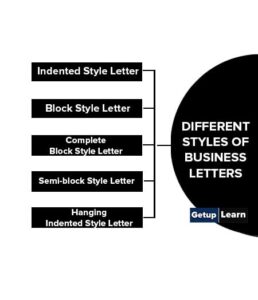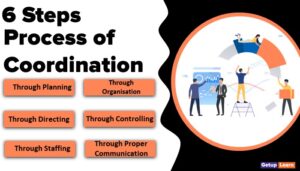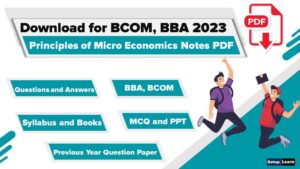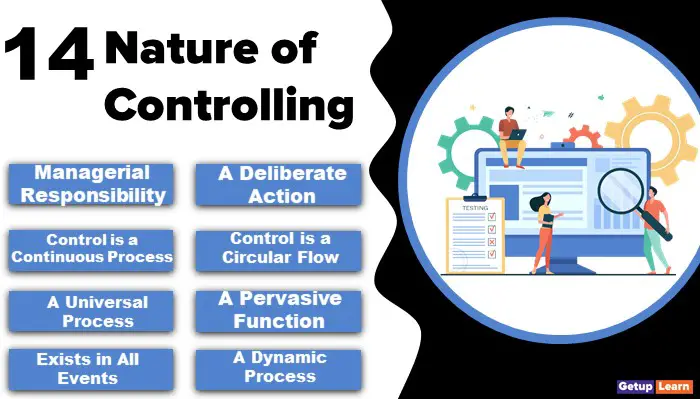
Table of Contents
-
1 Nature of Controlling
- 1.1 Managerial Responsibility
- 1.2 A Deliberate Action
- 1.3 Control is a Continuous Process
- 1.4 Control is a Circular Flow
- 1.5 A Universal Process
- 1.6 A Pervasive Function
- 1.7 Exists in All Events
- 1.8 A Dynamic Process
- 1.9 Forward-Looking
- 1.10 Goal-Oriented Function
- 1.11 Action-Oriented
- 1.12 Based on Planning
- 1.13 Controlling not of Human Beings but their Actions and Behaviour
- 1.14 Distinct from Interference
- 2 FAQ Related to the Nature of Controlling
Nature of Controlling
On the basis of the study and analysis of the different definitions of the term control we arrive at the following nature of controlling:
- Managerial Responsibility
- A Deliberate Action
- Control is a Continuous Process
- Control is a Circular Flow
- A Universal Process
- A Pervasive Function
- Exists in All Events
- A Dynamic Process
- Forward-Looking
- Goal-Oriented Function
- Action-Oriented
- Based on Planning
- Controlling not of Human Beings but their Actions and Behaviour
- Distinct from Interference
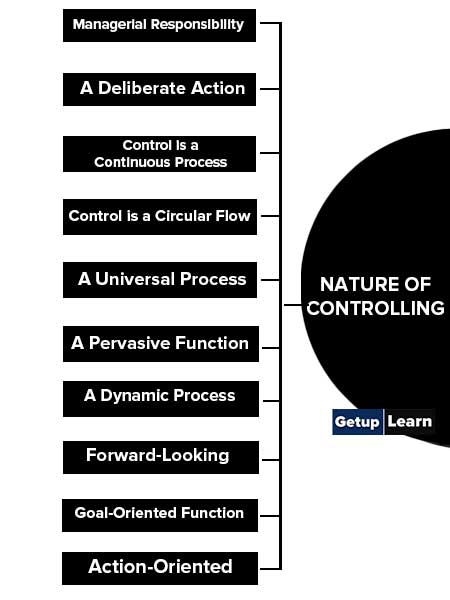
Managerial Responsibility
It is the responsibility of every manager to exercise effective control over the activities of the subordinates so that all the activities are performed continuously in accordance with plans adopted, instructions issued and principles established and the gap between the actual results and the desired results can be narrowed as much as possible.
A Deliberate Action
Control is not automatic but has to be exercised deliberately. Control can not be left to chance and the management has to actively exercise it.
For exercising control the manager has to determine the practical and achievable work norms, has to evaluate performed work periodically, has to analyse the reasons for deviations and find them out by comparing performed work with predetermined norms.
In case of significant deviations, he has to immediately take corrective actions so that repetition of deviations in performance in future can be checked.
Control is a Continuous Process
Control is not a function that if once exercised, its need ends forever. It is rather, a continuous activity. The need for control in an organisation is felt as long as the organisation goes on and survives. This is another nature of controlling.
Control is a Circular Flow
Control flows in a circle. It ends at the point from where it starts. Control begins with the determination of the objectives or standards. Thereafter by evaluating the actual performance, and comparing it with the standards, deviations are detected.
Then by analyzing the reasons for the deviations, necessary steps are taken to remedy the deviations and the standards are revised accordingly. Thus control begins with the setting up of standards and ends with the revision of the same.
A Universal Process
Control is required not only in business organisations but also in every type of organisation, be it political, religious, cultural or any other type of organisation.
Wherever better results are to be achieved, goals and objectives are to be achieved most efficiently and the gap between the actual performance and the desired performance is to be bridged, control is required. This is another nature of controlling.
A Pervasive Function
There exists a misunderstanding that control is required only at the top level of management. However, in fact, control is required at each level of management. According to George R Terry “Controlling exists at every management level.”
Every manager has to control the work and behaviour of his subordinates. It is a different matter that with the level of management scope of control varies.
Exists in All Events
An event may be passed, present or future, and it may be measurable or non-measurable. But control is required to control all events. Normally measurable events are related to the past, which paves the path for future control. However, in reality controlling is related to future events which can not be measured. This is another nature of controlling.
A Dynamic Process
Controlling is a dynamic process. For controlling prescribed standards or norms are to be reviewed constantly in accordance with the changing situations. Standards laid down once do not remain operational and valid forever. This fact makes controlling a dynamic process.
Forward-Looking
Controlling is future-oriented. Whatever had occurred in the past could not be controlled, but future efforts are controlled on the basis of the deviations that occurred in the past so that repetition of past mistakes in the future can be prevented.
Goal-Oriented Function
Controlling is exercised keeping the achievement of goals or objectives at the centre. Controlling is not an end in itself but only a means of achieving the ends. According to Robert Albanese, “Objective of controlling is to assure that actions contribute to the goal accomplishment.” This is another nature of controlling.
Action-Oriented
Controlling is related to taking corrective measures for achieving desired results. Mere performance appraisal is not controlling. Haynes and Massie have observed, Essence of controlling is in determining whether the activity is achieving the desired results”.
Based on Planning
Planning is the basis of controlling. Objectives and goals determined in planning provide the basis or standards for controlling, against which actual performance is compared, deviations are detected and corrective measures are taken.
Controlling not of Human Beings but their Actions and Behaviour
Control is not exercised on the human beings working in an organisation. It is rather their actions and behaviour that are controlled so that all the activities can be performed in accordance with pre-accepted plans.
Distinct from Interference
Controlling is not interference in the activities of the persons working in an organisation. In interference, the superior creates unnecessary and undesirable hurdles and obstacles in the working of his subordinates.
He may take away from them or reduces the freedom of work, but controlling is exercised to remove the mistakes and deficiencies in performance. Controlling is positive whereas interference is negative.
What is the nature of controlling?
The following is the nature of controlling:
1. Managerial Responsibility
2. A Deliberate Action
3. Control is a Continuous Process
4. Control is a Circular Flow
5. A Universal Process
6. A Pervasive Function
7. Exists in All Events
8. A Dynamic Process
1.9 Forward-Looking
10. Goal-Oriented Function
11. Action-Oriented
12. Based on Planning
13. Controlling not of Human Beings but their Actions and Behaviour
14. Distinct from Interference.

